Indonesia Elections 2024: Will Jokowi’s successor be ‘brave and firm’ in upholding human rights?
None of the three presidential candidates has offered concrete plans to address issues like excessive use of force by the police against civilians, civil rights groups say.
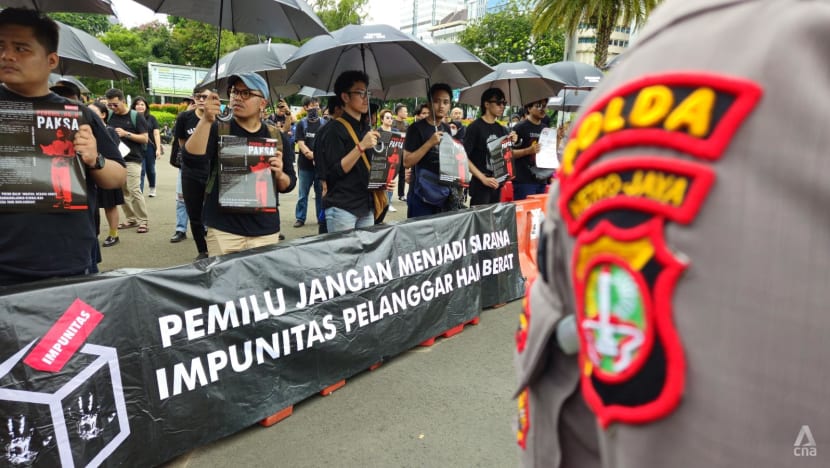
The Kamisan protest takes place every Thursday in front of Jakarta's Presidential Palace. It was started in 2007 by families of victims of human rights violations. (Photo: CNA/Leo Galuh)

This audio is generated by an AI tool.
JAKARTA: In over two decades as a civil rights activist, Mr Haris Azhar, 48, has been the target of multiple efforts to silence him.
It usually begins with government representatives offering money or projects to remain quiet and in their good books.
This escalates to online attacks by “buzzers”, people paid to spread social media content involving false narratives to discredit him.
The next step is when he is reported to the police and gets charged with criminal offences under laws like the controversial Electronic Information and Transactions Law, which critics say stifles freedom of expression.
Instances when he was targeted include in 2020, when he criticised Indonesia’s Omnibus or job creation law, which some see as being too pro-business at the expense of workers and the environment.
In April last year, he and a fellow activist, Ms Fatia Maulidiyanti, were charged with defaming Coordinating Minister for Maritime Affairs and Investment Luhut Pandjaitan after they speculated in a YouTube video on links between government military operations in Papua and the minister’s alleged mining interests.
Rights groups have said the operation of gold mines in the eastern province risks violating the land rights of indigenous Papuans, and allege abuses by security forces against civilians.
In January, Mr Haris and Ms Fatia were acquitted after a judge said it had been proven Mr Luhut had links to the mining company operating in Papua. The judge ruled that what they had said in the video was not a form of insult, but was based on research and analysis, local news outlet Kompas reported.
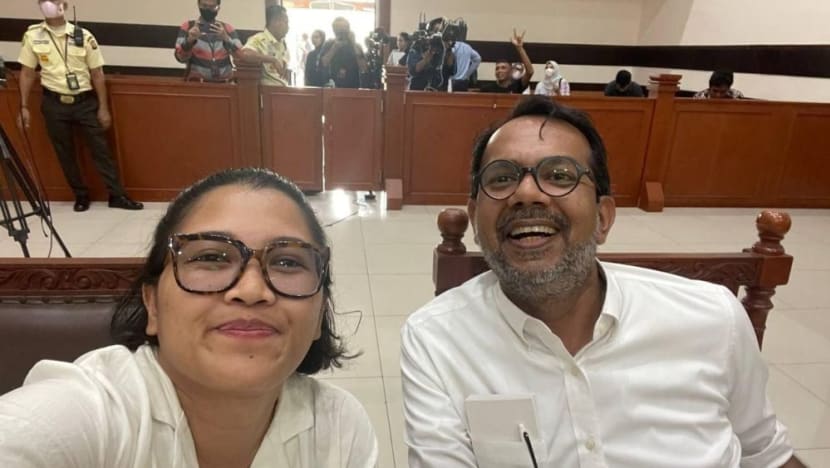
The prosecution has said it will appeal the decision.
“I think this has been widespread year after year during the Jokowi time, and many of them are linked to some economic policies related to business plans supported by the government,” Mr Haris said, referring to the purported chilling of activist voices under current president Joko Widodo’s administration.
Mr Haris is also founder of the Lokataru Foundation, a non-profit organisation that advocates for engagement among the state, communities and private sector based on the values of human rights and rule of law.
Political parties, he told CNA, have a “long history” of using activists during elections to show how Indonesia upholds democracy, like in the 2014 and 2019 elections when candidates met and posed for pictures with leaders of rights groups.
“But once they are in power, they just go (ahead) without considering what they’re supposed or not supposed to do in their policies.”
Mr Haris is among a number of Indonesian activists who are unconvinced the next president of Southeast Asia’s largest democracy will make concerted efforts to tackle human rights issues.
According to them, none of the three presidential candidates – Anies Baswedan, Prabowo Subianto and Ganjar Pranowo – has made concrete plans to address ongoing problems like the chilling of free speech, abuse of power by the Indonesian National Police, and the longstanding issue of how pro-democracy activists were murdered and abducted in the past, with some remaining missing until today.
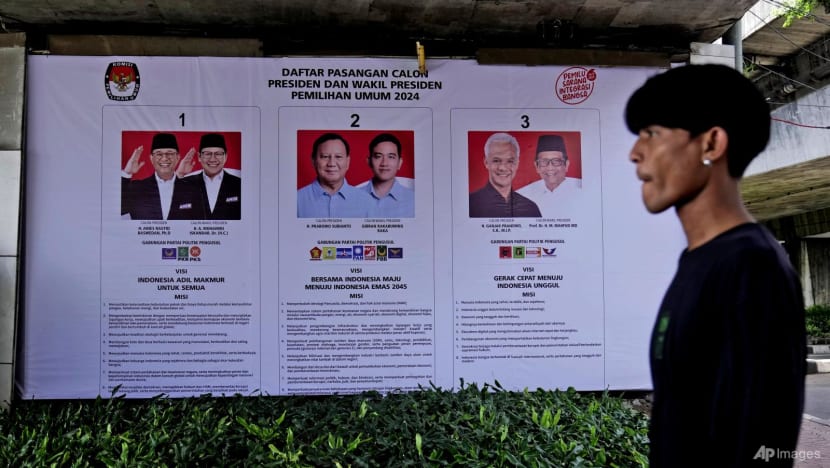
More than 200 million Indonesians will head to the polls on Feb 14 to elect their next president, with multiple surveys indicating that Mr Prabowo – a former general accused of human rights violations – is by far the frontrunner.
This is seen as another stumbling block for Indonesia’s Reformasi movement, which started in 1998 after former president Suharto’s resignation marked the end of his longtime dictatorship.
The movement had six goals, including bringing Suharto and his cronies to court, amending the 1945 constitution, widening regional autonomy, removing the dual functions of the Indonesian Armed Forces, eradicating corruption and enforcing the rule of law.
While some progress has been made, most notably under former president Abdurrahman Wahid, who tried reforming the military and giving more autonomy to provinces like Aceh, activists say there is still some way to go.
In fact, observers noted that reforms seem to have gone backwards under outgoing two-term President Jokowi, pointing to setbacks in areas like freedom of association and expression, as well as law enforcement and corruption.
In 2023, Indonesia scored 58 out of 100 points in Freedom House’s global freedom index, which rates people’s access to political rights and civil liberties. This figure has been steadily declining since 2019, when Jokowi was re-elected for a second term.
Activists said they were not hopeful Mr Prabowo will halt this perceived democratic backsliding. Largely believed to have Jokowi's backing, Mr Prabowo has stated he will continue the incumbent president’s policies but has remained the vaguest among the three candidates on plans to tackle human rights issues.
While Mr Anies and Mr Ganjar have announced intentions to resolve some of these issues, the activists believe these could turn out to be empty promises perennially made during the campaign season to score political points.
Indonesia’s multi-party politics, where politicians have to garner support from members of other parties in return for positions or business contracts that could trigger human rights concerns, is also likely to stay beyond the election, they said, hampering any meaningful progress.
“Barring any concrete plans of protections and promotions of human rights (by the candidates) … honestly I’m not holding my breath,” said Mr Wirya Adiwena, deputy director of Amnesty International Indonesia.
In its human rights agenda for Indonesia’s next leader published on its website, Amnesty International recommended repealing or revising “problematic regulations” that are used to suppress human rights such as freedom of expression and peaceful assembly.
The government should also impartially and transparently investigate allegations of human rights violations by members of security forces, as well as threats and attacks against human rights activists and journalists, it stated, among other recommendations.
ALLEGATIONS OF POLICE BRUTALITY
An instance of excessive force used by the police against civilians, Mr Wirya said, is the Kanjuruhan stadium tragedy in October 2022. Football fans had clashed with the police, who fired tear gas at them as they rushed for the exits.
More than 130 people died and hundreds were injured. Investigations by government-sanctioned fact-finding teams concluded the crush was primarily caused by police shooting tear gas at spectators.
While two Indonesian officials and three police officers were charged, convicted and sentenced to jail terms of between one to two-and-a-half years, victims' families feel measures by the government did not go far enough.
Between July 2022 and June 2023, the Commission for Missing Persons and Victims of Violence, a non-governmental organisation, recorded 622 cases of police violence, news outlet Tempo reported.
Civilians who are struggling to protect their living space against “exploration and exploitation” by corporations are specifically repressed by police forces, the civil rights group noted, referring to the “significant numbers” of police officers deployed to Papua between July 2020 and June 2023.
“The police now act as both a security and political force, actively building legal cases against government opponents, silencing critics and persecuting those who threaten the president’s power,” ISEAS-Yusof Ishak Institute visiting fellow Made Supriatma wrote in a 2020 commentary published by the East Asia Forum.
Mr Wirya told CNA that plans to address cases of alleged police brutality were “largely absent” from the presidential candidates’ campaign messages.
“It is very concerning that there is no talk about addressing accountability or this practice that has been happening in recent years,” he said.
About the past gross violations of human rights … we have not seen any concrete roadmap from any presidential candidate about this.”
FORCED DISAPPEARANCES
In their election manifestos, both Mr Anies and Mr Ganjar pledged to resolve past cases of gross human rights violations, while Mr Prabowo said he would “uphold human rights” without mentioning past incidents, news outlet Jakarta Post reported.
During Indonesia’s first official presidential debate last December, Mr Ganjar pressed Mr Prabowo on his alleged role in the forced disappearances of pro-democracy activists from 1997 to 1998, when he was commander of the army’s special forces.
Mr Prabowo has repeatedly denied the allegations and, during the debate, said he has been asked these questions numerous times.
“I think I'm a staunch defender of human rights,” he asserted, claiming he now has the support of some activists who were arrested for being a perpetrator of the 1998 riots. “Don't politicise human rights issues.”
A spokesperson for Mr Prabowo’s party Gerindra told the Jakarta Post this does not mean he will ignore the issue if elected.
“In principle, Prabowo and Gibran will continue Jokowi’s programs if they are deemed good, including (resolving past abuses),” the spokesperson said, referring to Mr Prabowo’s running mate Gibran Rakabuming Raka, who is also Jokowi’s son.
Last June, Jokowi launched a non-judicial programme to provide remedies to victims of past human rights violations, although he has not discounted judicial measures after acknowledging 12 of such incidents.
In addition to the forced disappearances, these include the mass killings of suspected communists from 1965 to 1966, and the torture and murder of civilians by security forces during a decades-long separatist conflict in Aceh province.
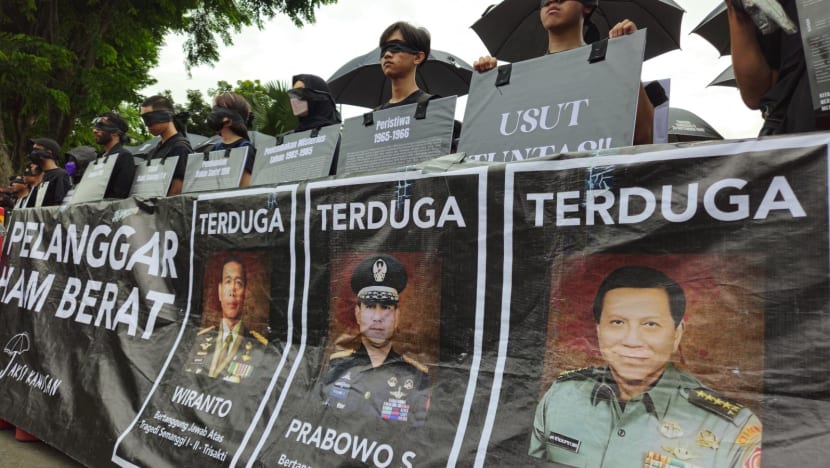
Previous and current governments have faced challenges in addressing the country’s dark past, partly due to difficulties in vetting incidents that happened decades ago.
For instance, Jokowi’s programme only came years after the National Commission on Human Rights in 2006 identified past incidents of severe human rights violations and recommended reparations for the victims.
The commission has also investigated some of these incidents, but there have been no prosecutions thus far.
While Human Rights Watch Indonesia researcher Andreas Harsono described Jokowi’s programme as a “very tiny step” and reckoned the candidates will continue it, he called for a commission or judicial means to “find the truth”.
“Those are the things that the survivors and victims’ families would like,” he said, stressing that more public education was needed on these past violations.
Mr Andreas also urged the next president to revoke what he called “rubber” laws – local slang for clauses in legislation like the Electronic Information and Transactions Law that could limit free speech.
“If all these toxic regulations are revoked or at least not enforced, it will open the way for other human rights abuses to be investigated and documented judicially, through investigative reporting and many other mechanisms,” he said.
VICTIM’S MUM CONTINUES FIGHT FOR JUSTICE
For Mdm Maria Catarina Sumarsih, 72, the fight for justice for her late son began before Jokowi became president, and is set to continue under his successor.
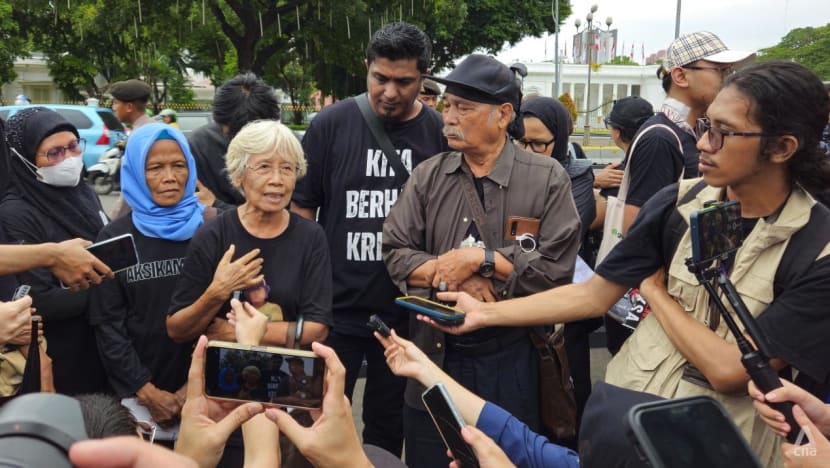
Student activist Bernardinus Realino Norma Irmawan, who was 20 at the time, was shot dead with a “standard military bullet” in what has been called the first Semanggi shooting of Nov 13, 1998 in Jakarta.
When Wawan, as the family called him, was still around, he and his family would start conversations at the dinner table with an update on his time in university, but these quickly turned political.
They talked about the need to eradicate nepotism and corruption, and the importance of the rule of law. They wanted to see then-newly resigned president Suharto and his cronies brought to justice.
On Nov 13, 1998, Wawan – who by then was actively campaigning for civil rights – joined thousands of students in a sit-down protest near Atma Jaya University and the Semanggi flyover to show their mistrust of Suharto's successor, former president BJ Habibie.
Authorities responded by firing live ammunition. Wawan did not make it home that day, one of 17 people killed.
Every Thursday, Mdm Maria and other protestors have stood in front of Jakarta’s Presidential Palace carrying black umbrellas to commemorate the victims of the shootings and abductions.
The Kamisan protest – Kamis means Thursday in Bahasa Indonesia – marked its 17th anniversary on Jan 18 this year.
Mdm Maria’s fight for justice has encountered several legal and legislative roadblocks.
In 2007 and 2020, Indonesia’s House of Representatives and the government respectively decided that the Semanggi shootings do not meet the definition of a “severe” human rights violation under the law, and thus do not qualify to be prosecuted in an ad hoc human rights court.
But in January last year, Jokowi acknowledged that the shootings were indeed part of the 12 severe human rights violations. He said the government was making efforts to provide reparations to victims, without elaborating on judicial measures.
“We reject non-judicial resolutions because Indonesia is a constitutional state. Every president, before carrying out their duties, takes an oath to comply with the constitution,” Mdm Maria said.
As the constitution affirms the rule of law in Indonesia, “whoever becomes the president is obliged and must be accountable for severe human rights violations according to the law”, she said.
On the same day, civil rights groups released a statement again calling on Jokowi to set up an ad hoc human rights court, and to locate the 13 people cited as still missing by the National Commission on Human Rights.
They also urged the government to immediately rehabilitate and provide compensation to the families of the disappeared, and to ratify the UN Convention for the Protection of All Persons from Enforced Disappearance.
HARDLINERS STILL AROUND
While political researcher Wasisto Raharjo Jati believes Indonesia’s next president should be “brave and firm” in delivering on human rights reforms, he notes there will be constraints that may ultimately result in “little effort” made.
“Because many hardliners are still in the government,” he told CNA, referring to retired generals linked to past human rights abuses who still occupy public positions.
“Some officials refuse to acknowledge it, whereas many civil society activists are strongly pushing for these issues to be solved. So, this is the gap in (the) public space right now,” said Mr Wasisto of Indonesia’s National Research and Innovation Agency.
Mr Wasisto noted Jokowi continues to command a high approval rating as his social assistance and infrastructure development policies have made him popular with the middle- to lower-income segments of the population.
The acquitted activist Mr Haris said this approval must be seen alongside other metrics, like how many people were sceptical of the government’s messages or afraid of expressing their opinion.
He remains undaunted by efforts to silence him.
“I feel more and more energised,” he added. “This is very important for us to build advocacy.”
Additional reporting by Leo Galuh




















